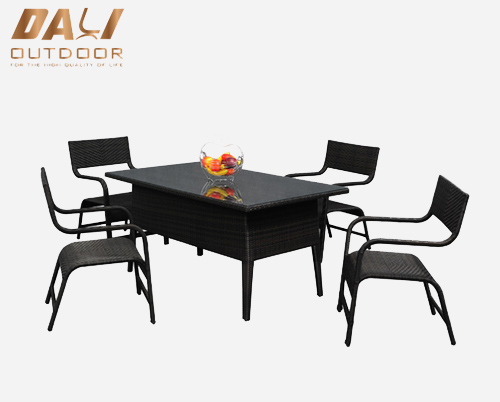Aluminum dining tables are not prone to rust like iron or steel, thanks to their natural corrosion resistance. However, they can still develop surface discoloration or corrosion in certain situations, such as exposure to specific chemicals or environmental factors. If you have a rusty aluminum dining table, there are several steps you can take to remove the rust and restore the table’s appearance. Here are some methods you can try:
Use white vinegar: Soak a cloth in white vinegar and apply it to the rusted areas of the table. Let it sit for a few hours, then scrub the rust away with a soft-bristled brush.
Use baking soda and water: Mix baking soda and water to create a paste, then apply it to the rusted areas of the table. Let it sit for a few hours, then scrub the rust away with a soft-bristled brush.

Use a rust remover: You can purchase a rust remover at a hardware store or online. Follow the instructions provided on the product to remove the rust from your table.
Use a wire brush: Use a wire brush to remove the rust from your table. Be sure to wear gloves and safety glasses to protect yourself from any debris.
Use a sandblaster: If the rust is particularly stubborn, you may need to use a sandblaster to remove it. This is a more aggressive method and should only be used as a last resort.
Once you have removed the rust from your table, it is important to take steps to prevent it from returning. You can do this by applying a coat of wax or a rust inhibitor to the table.
Rinse and Dry:
After using any cleaning agents, thoroughly rinse the affected area with clean water to remove any residue. Ensure the table is completely dry after cleaning.
Protective Finish:
To help prevent future corrosion, you can apply a protective finish, such as a clear automotive wax or a specialized aluminum sealer. Follow the product instructions carefully.
Preventative Measures:
Consider taking preventative measures, such as using coasters, placemats, or tablecloths, to protect the table's surface from spills, chemicals, or abrasive materials.
Regular Maintenance:
Perform regular cleaning and maintenance to keep the table in good condition and prevent further corrosion.
It's important to remember that aluminum dining tables are naturally corrosion-resistant, so severe rust or corrosion issues are rare. If the rust or corrosion is extensive or difficult to remove, or if you have concerns about damaging the table further, it may be wise to consult a professional for assistance. Additionally, following the manufacturer's care and maintenance guidelines for your specific aluminum dining table can help prevent corrosion issues in the first place.

 English
English España
España عرب
عرب 简体中文
简体中文





